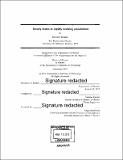Steady states in rapidly evolving populations
Author(s)
Melissa, Matthew (Matthew J.)
DownloadFull printable version (7.449Mb)
Other Contributors
Massachusetts Institute of Technology. Department of Physics.
Advisor
Mehran Kardar.
Terms of use
Metadata
Show full item recordAbstract
Populations are subject to mutations conferring beneficial effects, as well as mutations conferring deleterious effects. Even if deleterious mutations occur much more frequently than beneficial mutations, the contribution of deleterious mutations to the overall rate of change of the population-wide mean fitness may be limited, due to the efficient action of selection. However, in particularly rapidly evolving populations, the stochastic accumulation of deleterious mutations may negate a significant fraction of the fitness increments provided by beneficial mutations, or even result in an overall decrease in fitness over time. Here we obtain a constraint on beneficial and deleterious mutation rates and selection pressures in order for positive adaptation to counterbalance fitness decline via Muller's ratchet. The steady state that separates parameter regimes of positive adaptation and negative adaptation is characterized by appealing to the exponential dependence of fixation probabilities on fitness effect sizes. We consider a range of fitness-mediated epistatic interactions and the corresponding implications regarding the existence, location and stability of long-term evolutionary fixed points.
Description
Thesis: S.M., Massachusetts Institute of Technology, Department of Physics, 2017. Cataloged from PDF version of thesis. Includes bibliographical references (pages 63-68).
Date issued
2017Department
Massachusetts Institute of Technology. Department of PhysicsPublisher
Massachusetts Institute of Technology
Keywords
Physics.